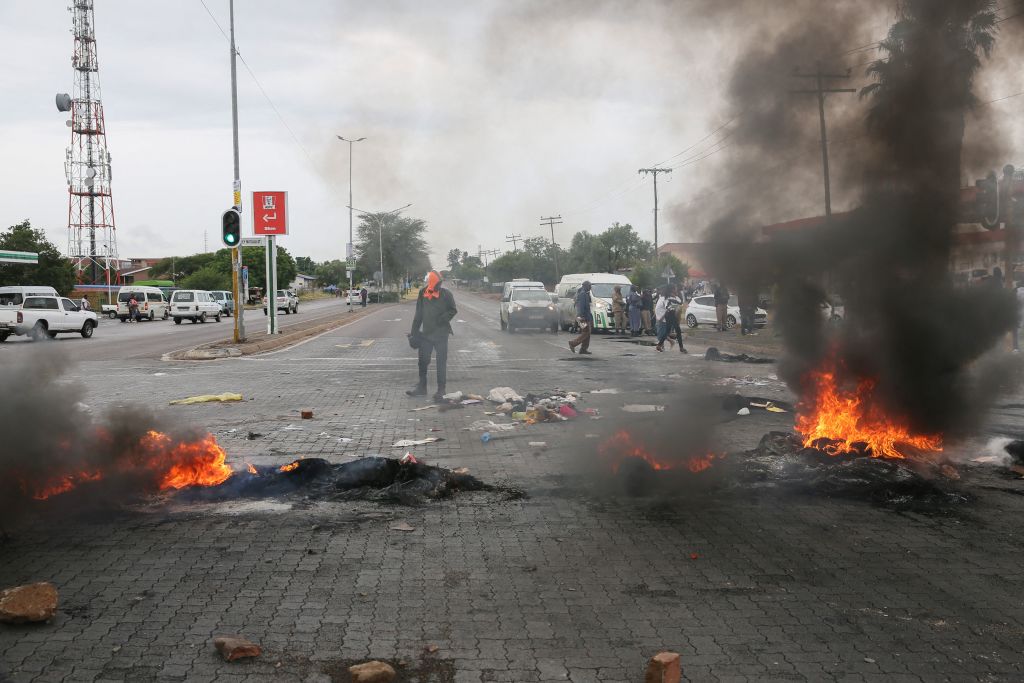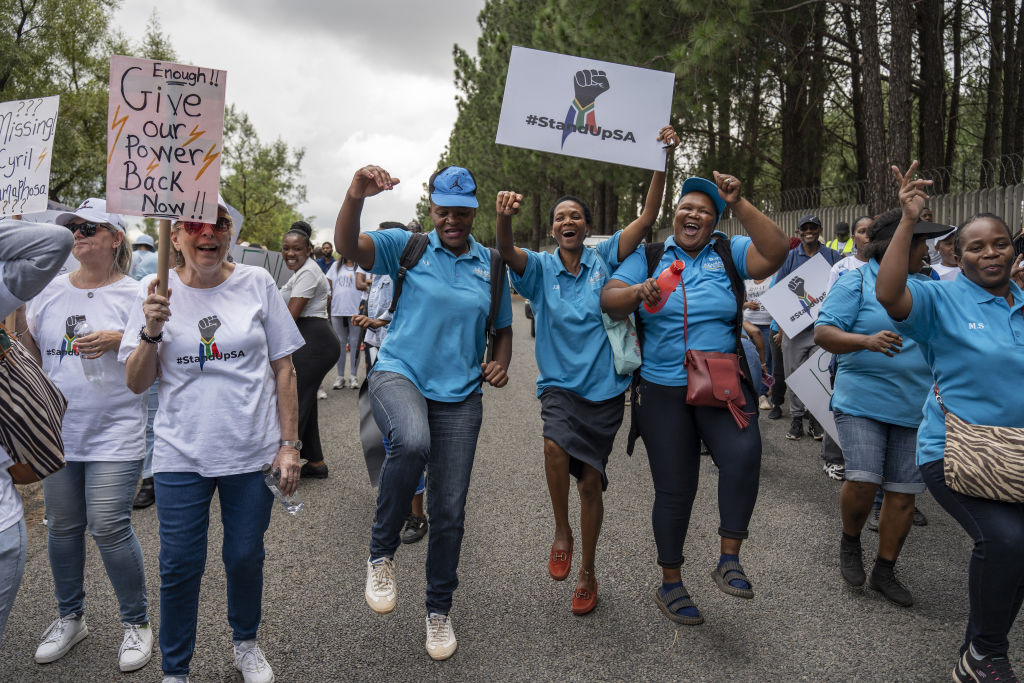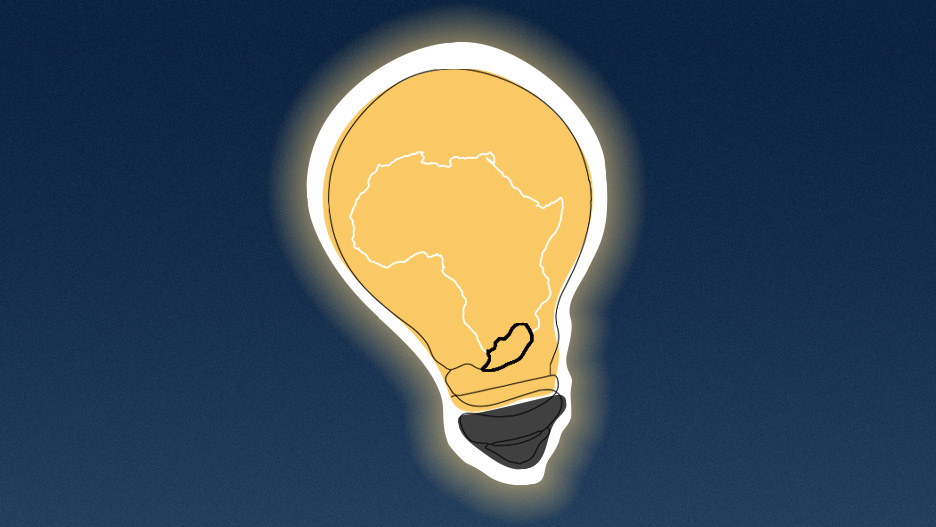Cape Town
South Africa is falling apart. Blackouts of up to ten hours a day are bringing businesses to a halt, making teaching harder and turning traffic lights dark. Food is rotting in warm fridges. There were more than 200 blackouts last year and they have continued every day so far in 2023.
ANC strategists question whether any party can survive the public anger over the mismanagement of the grid
A country that once saw itself as Africa’s industrial powerhouse is now regularly without power. The cause is a debt-ridden and run-down fleet of power stations, which have been starved of repairs and regularly break down. Electricity supplies have to be switched off to stop the grid collapsing. What began in 2007 as an emergency measure has become routine, while the building of two new plants has been bungled.
The power cuts are affecting every sector. Erratic supply is hitting the country’s mining giants, its major exporters. Small grocers and supermarkets are shutting shop. ShopRite, Africa’s biggest grocer, said in its financial results that it had to spend an extra £26 million on diesel in the final half of last year to run supermarket generators during power cuts. The country’s sugar industry estimates it will lose £33 million this year. Unemployment is running at around a third.
After 29 years in power, the crisis is about more than the economy for the ruling African National Congress. Parts of Johannesburg have been left without water because power cuts have hit pumping stations. Desperate residents have blocked streets with burning tyres. ‘Anybody who still denies we are in the midst of a national emergency is either being paid to do so or living in a parallel universe,’ said Cape Town’s chamber of commerce.

The state-run company that owns the power stations, Eskom, is getting deeper into debt. It is common for local governments, many of them in ANC-controlled districts, to fail to pay their electricity bills. In July, the company was owed nearly £2.5 billion in unpaid bills by municipalities alone. As recently as 2001, the Financial Times named Eskom the world’s best power company. Yet energy experts were already warning that the country risked running out of power if it didn’t build more capacity.
Perhaps most damaging of all, Eskom was at the centre of a corruption scandal that took place under the former president Jacob Zuma. A judicial probe found that from 2009 to 2018, Zuma helped his friends, the Gupta family, to ‘capture’ the utility so it could ‘divert Eskom’s assets to the Guptas’ financial advantage’. Eskom is still trying to recover from years of dodgy deals and embezzlement.
For many South Africans, the crisis is as much about the ANC as energy: the party of Nelson Mandela has become mired in corruption and can’t seem to deliver basic public services. Even with Zuma gone, corruption at Eskom is far from over, according to the company’s most recent chief executive. André de Ruyter says that criminality in the organisation is well-organised and deeply embedded. Machinery has been deliberately sabotaged so that gangs can benefit from maintenance contracts; good coal is stolen and sold off, to be replaced with poor-quality fuel or even rocks.
Rather than being supported by the ANC government, the energy minister accused Eskom of ‘actively agitating for the overthrow of the state’ with its rolling power cuts. De Ruyter decided he had had enough and resigned. Hours later, after drinking coffee in his office, he was taken ill, gasping for breath. Blood tests showed cyanide, in what he believes was an assassination attempt.
‘The energy crisis is an existential threat to our economy and social fabric,’ says South Africa’s President, Cyril Ramaphosa. He recently declared a state of disaster, but says fixes will take time. Eskom has announced it will raise electricity tariffs by 19 per cent, provoking more anger, and wants to shift a chunk of debt on to the state.
The utility needs as much as 6,000MW of extra capacity to be able to fix stations without cutting power. Only three coal-fired stations in the world can produce that amount of electricity. So instead of building a new plant, which would take up to a decade, the company is trying to fill gaps with private generators while promoting solar and wind power. Opposition-run Cape Town has negotiated a feed-in tariff for the city to pay businesses and residents to supply their excess electricity to the local grid. Ramaphosa is trying to encourage private sector projects while negotiating energy imports from neighbouring countries.
Even the quickest projects will take years before they show much difference. Solutions are unlikely to come before the next election. Ramaphosa is heading to the polls next year in what will likely be the most important election since the end of white rule.

The ANC has led South Africa since apartheid was abolished in 1994. For much of that time it has appeared unassailable. ANC strategists now question whether any party can survive the public anger that comes from such appalling mismanagement of the country’s grid. Many hoped that Ramaphosa, a favourite of Mandela, would help right the country after the predations of Zuma. Instead, he has proved disappointing, struggling to implement reforms and seeming unable to move against Zuma’s supporters.
In municipal elections in 2021, the party’s share of the vote fell below 50 per cent for the first time. Ipsos polling in December found that two-thirds of voters thought the power cuts were undermining ANC support, although disunity among the opposition makes it difficult to build a coalition that can unseat Ramaphosa. Whatever the outcome of the election, it will be hard to predict: 45 per cent of South Africans said they are considering abstaining.
In January, the ANC secretary-general Fikile Mbalula was giving a speech on the energy crisis, promising voters that his party would be able to fix the grid, when his mic cut out and the room went dark. This time there was no conspiracy. It was just another of South Africa’s never-ending blackouts.






Comments